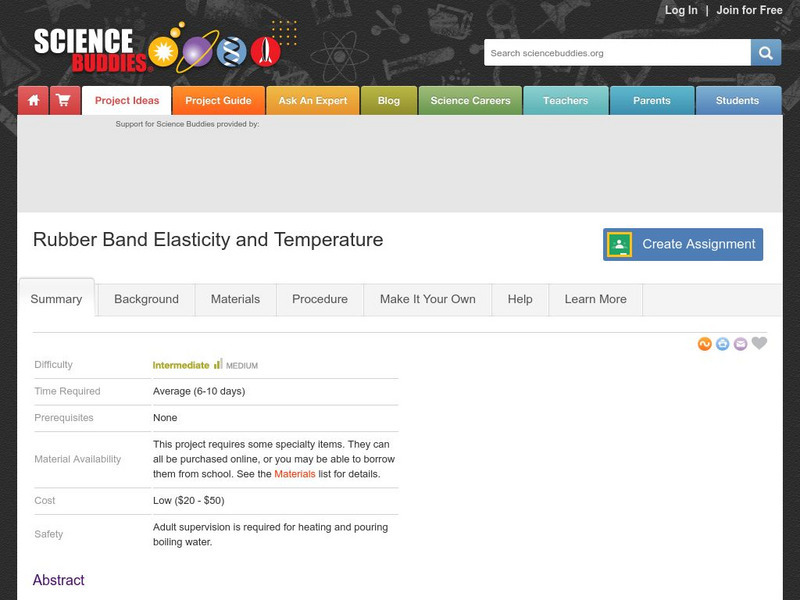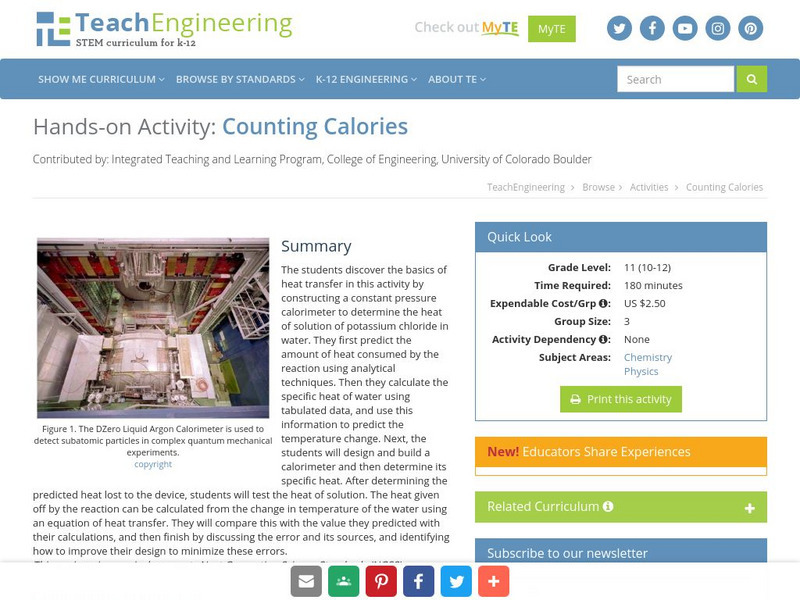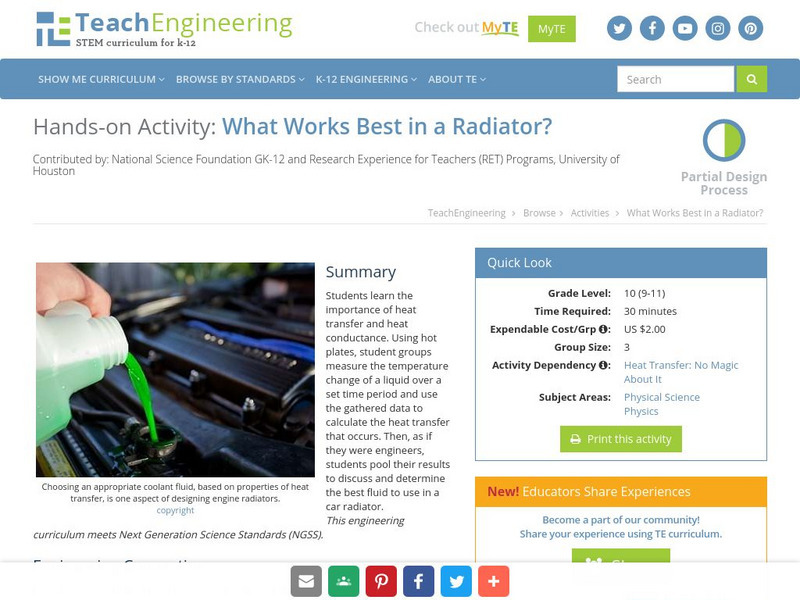OpenStax
Open Stax: Temperature Change and Heat Capacity
In this section of the textbook, find information about the transfer of heat that changes an object's temperature. Also discussed is the equation of heat transfer that relates the change in temperature, mass, and specific heat. There is...
PBS
Pbs Learning Media: Heat Transfer
In this interactive activity adapted from the Wisconsin Online Resource Center, students will learn how heat can be transferred in one of three ways: conduction, convection, and radiation.
Khan Academy
Khan Academy: Heat and Temperature
An explanation of using heat capacity to calculate heat.
Wolfram Research
Wolfram Science World: Specifiic Heat
This site has information on specific heat,the amount of heat required to change a unit mass of a substance by one degree in temperature. Included are many links and formulas.
City University of New York
Brooklyn College:heat and Temperature Interactive Lab
Use this online activity to explore how various substances respond to changes in temperature. Learn how to calibrate a thermometer.
The Environmental Literacy Council
Environmental Literacy Council: Temperature
The difference between heat and temperature is explained, followed by a discussion of temperature and its relation to global climate change. Gallileo Galilee, Daniel Gabriel Fahrenheit, Anders Celsius, and Carl Linnaeus are mentioned in...
CK-12 Foundation
Ck 12: Heat
[Free Registration/Login may be required to access all resource tools.] Using the law of conservation of energy as a starting off point, students use the specific heat equation to perform calculations that relate mass, specific heat,...
CK-12 Foundation
Ck 12: Specific Heat
[Free Registration/Login may be required to access all resource tools.] Students explore the concept of specific heat, learn how it is calculated, and find out how different materials have different specific heat values.
PBS
Pbs Kids: Design Squad Challenge: Feel the Heat (Pdf) [Pdf]
Hands-on challenge to heat things up by building a solar hot water heater. Provides full list of materials with ideas on how to design, build, test, and redesign it if necessary. Activity focuses on the engineering design process and the...
American Chemical Society
Middle School Chemistry: Chapter 2: Changes of State
Five chemistry lessons about phase changes between the states of mattter complete with handouts and animations.
Carnegie Mellon University
Chem Collective: Meals Ready to Eat
While camping on the Appalachian Trail, a storm dampens all the fire wood and you must design a chemical reaction to heat your meal. In this activity, students design an experiment in the virtual lab to determine the heat of reaction for...
Texas Education Agency
Texas Gateway: Phase Change and Latent Heat
By the end of this section, you will be able to examine heat transfer and calculate final temperature from heat transfer.
Science Buddies
Science Buddies: Rubber Band Elasticity and Temperature
Many materials expand when heated and contract when cooled. What do you think will happen to the elasticity (stretchiness) of a rubber band when it is heated or cooled to various temperatures?
Physics Classroom
The Physics Classroom: Thermal Physics: Measuring the Quantity of Heat
Through interactive exercises and illustrated example problems, students learn about specific heat capacity and measuring the quantity of heat.
TryEngineering
Try Engineering: Temperature Tactics
Learners practice the engineering design process as they explore devices used to measure changes in temperature. They work in teams to design, build, test, and evaluate their own temperature gauge made from everyday materials.
Texas Instruments
Texas Instruments: Heat Transfer by Conduction
The purpose of this activity is to monitor the transfer of heat between 2 materials by measuring the temperature changes in them.
Physics Aviary
Physics Aviary: Practice Problems: Specific Heat of a Fluid
This program asks students to determine the specific heat of a fluid based on the amount of temperature change that occurs when a hot object is placed in the fluid.
Physics Aviary
Physics Aviary: Guided Specific Heat Lab
This lab is designed to have students learn how to calculate the specific heat of a liquid based on the temperature changes that occur when hot water is added to the liquid.
Physics Aviary
Physics Aviary: Guided Specific Heat of Solid Lab
This lab is designed to have students learn how to calculate the specific heat of a solid based on the temperature changes that occur when a hot solid is added to cold water.
Utah Education Network
Uen: Heat Sources Feeling Hot Hot Hot!
How does temperature vary in the sunshine and shade. Find out as you participate in this lab activity. The resource also has some online thermometers for you to read.
American Chemical Society
Middle School Chemistry: Heating and Cooling a Liquid
This simulation allows students to make observations about how particle motion changes as the overall temperature of a liquid changes.
Chem Tutor
Chemtutor: Heating Curve Problems
Nice set of problems dealing with the concept of a heating curve. Students can click on the question and get immediate feedback on their answer.
TeachEngineering
Teach Engineering: Counting Calories
The students discover the basics of heat transfer in this activity by constructing a constant pressure calorimeter to determine the heat of solution of potassium chloride in water. They first predict the amount of heat consumed by the...
TeachEngineering
Teach Engineering: What Works Best in a Radiator?
Students learn the importance of heat transfer and heat conductance. Using hot plates, student groups measure the temperature change of a liquid over a set time period and use the gathered data to calculate the heat transfer that occurs....





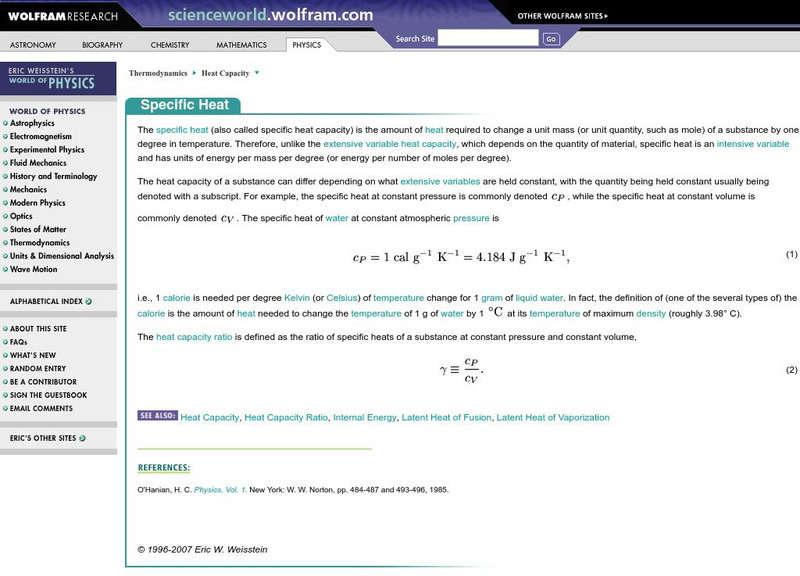
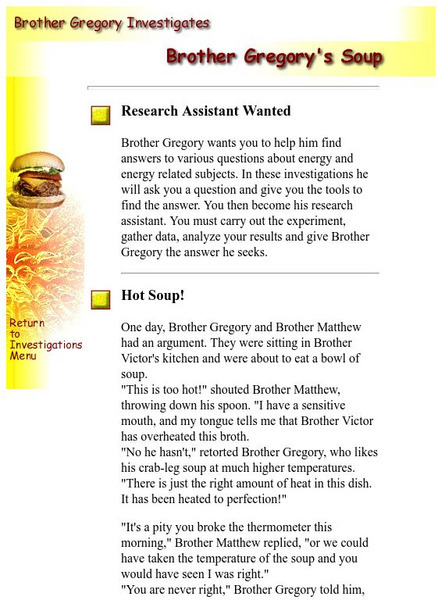

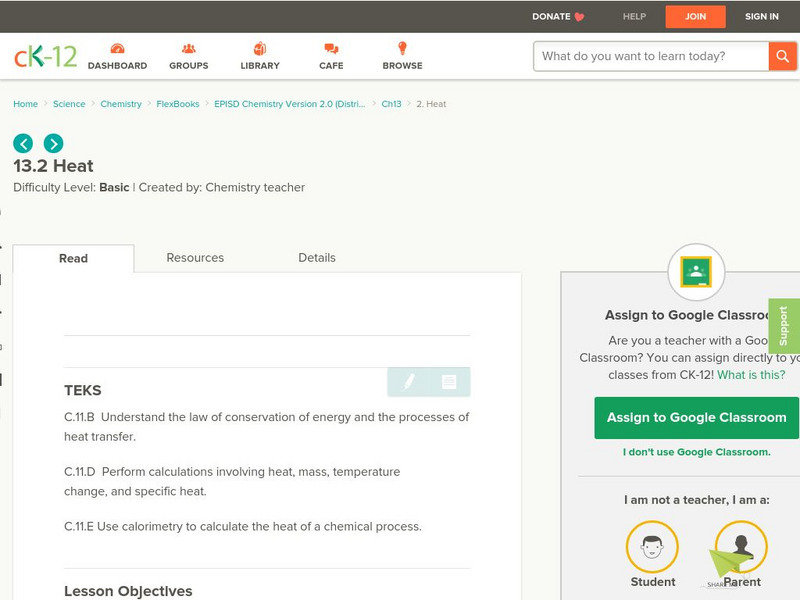
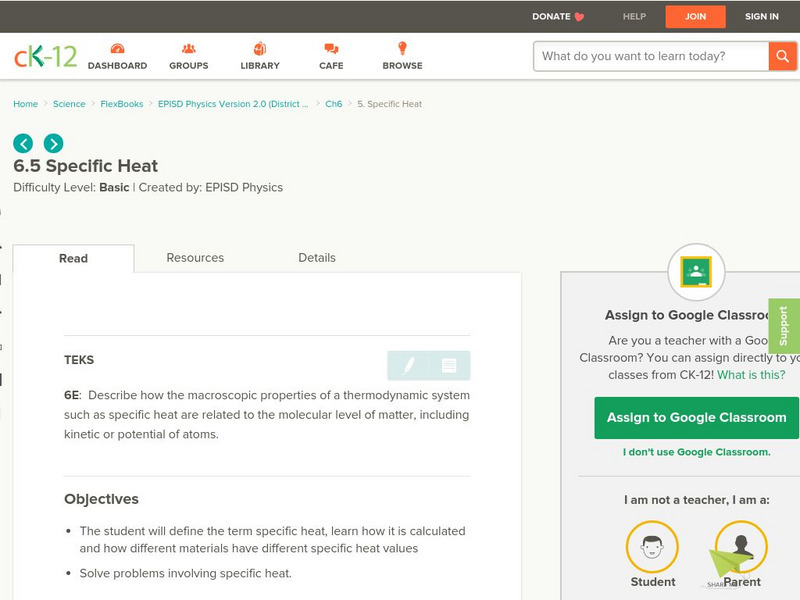
![Pbs Kids: Design Squad Challenge: Feel the Heat (Pdf) [Pdf] Handout Pbs Kids: Design Squad Challenge: Feel the Heat (Pdf) [Pdf] Handout](https://content.lessonplanet.com/knovation/original/39873-ae8d75ec09f51ea05c443973c536d5aa.jpg?1661243849)


